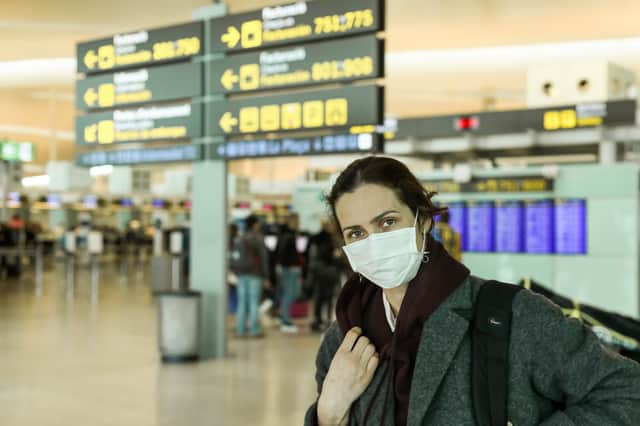Everything you need to know about booking holidays abroad during the coronavirus outbreak


The global coronavirus outbreak continues to spread, with some countries imposing travel restrictions, and numerous airlines beginning to cancel flights to certain destinations.
But with summer quickly approaching, is it advisable to book a holiday, and what are your rights if your trip gets cancelled due to the Covid-19 outbreak? Here’s everything you need to know.
Is it safe to travel abroad?
Advertisement
Hide AdAdvertisement
Hide AdThere are certain areas which the Foreign and Commonwealth Office (FCO) advises against travelling to.
However, the World Health Organisation (WHO) explains that they are continuing “to advise against the application of travel or trade restrictions to countries experiencing Covid-19 outbreaks.
“In general, evidence shows that restricting the movement of people and goods during public health emergencies is ineffective in most situations and may divert resources from other interventions.
“Furthermore, restrictions may interrupt needed aid and technical support, may disrupt businesses, and may have negative social and economic effects on the affected countries.”
Advertisement
Hide AdAdvertisement
Hide AdThe WHO adds that, in certain situations, measures that restrict the movement of people “may prove temporarily useful,” but that “travel measures that significantly interfere with international traffic may only be justified at the beginning of an outbreak.”
This is because “they may allow countries to gain time, even if only a few days, to rapidly implement effective preparedness measures.”
Where should I avoid visiting?
Gov.uk explains that, “The FCO is currently advising against all travel to Hubei Province, and against all but essential travel to the rest of mainland China.”
The FCO is also advising against:
All travel to the city of Daegu and all but essential travel to the city Cheongdo, in South KoreaAll but essential travel to 10 small towns in the Lombardy region, and one in the Veneto region of Italy
Advertisement
Hide AdAdvertisement
Hide AdThe FCO is not advising against travel to any other country or territory as a result of coronavirus risks.
Can I claim money back for cancelled holidays or flights?
Moneysavingexpert.com explains that purchasing travel insurance as soon as you book your holiday is important - now more than ever.
“We always say get your travel insurance ASAB (As Soon As you Book), and this has never been more important,” advises the website.
“Right now though, it's even more urgent. Insurance policies that will cover cancellations to official no-go Covid-19 areas will only pay out if you got the insurance before the country is ruled off-limits. So the earlier you get it, the safer, if – as is likely – formal guidance changes.
Advertisement
Hide AdAdvertisement
Hide Ad“The key trigger for travel insurance covering you cancelling your holiday is if the Foreign & Commonwealth Office (FCO) advises ‘against all but essential travel’, or the even more serious ‘against all travel’, even if your flight and hotel are still available.
“Currently, FCO no-travel advisories due to Covid-19 only cover China (not Hong Kong or Macau), two South Korean cities and a few towns in northern Italy, but it's likely to grow.”
Coronavirus: the facts
What is coronavirus?
COVID-19 is a respiratory illness that can affect lungs and airways. It is caused by a virus called coronavirus.
What caused coronavirus?
The outbreak started in Wuhan in China in December 2019 and it is thought that the virus, like others of its kind, has come from animals.
How is it spread?
Advertisement
Hide AdAdvertisement
Hide AdAs this is such a new illness, experts still aren’t sure how it is spread. But.similar viruses are spread in cough droplets. Therefore covering your nose and mouth when sneezing and coughing, and disposing of used tissues straight away is advised. Viruses like coronavirus cannot live outside the body for very long.
What are the symptoms?
The NHS states that the symptoms are: a dry cough, high temperature and shortness of breath - but these symptoms do not necessarily mean you have the illness. Look out for flu-like symptoms, such as aches and pains, nasal congestion, runny nose and a sore throat. It’s important to remember that some people may become infected but won’t develop any symptoms or feel unwell.
What precautions can be taken?
Washing your hands with soap and water thoroughly. The NHS also advises to cover your mouth and nose with a tissue or your sleeve (not your hands) when you cough or sneeze; put used tissues in the bin immediately and try to avoid close contact with people who are unwell. Also avoiding touching eyes, nose and mouth unless your hands are clean.
Should I avoid public places?
Most people who feel well can continue to go to work, school and public places and should only stay at home and self isolate if advised by a medical professional or the coronavirus service.
What should I do if I feel unwell?
Advertisement
Hide AdAdvertisement
Hide AdDon’t go to your GP but instead call NHS 111 or look online at the coronavirus service that can tell you if you need medical help and what to do next.
When to call NHS 111
NHS 111 should be used if you feel unwell with coronavirus symptoms, have been in a country with a high risk of coronavirus in the last 14 days or if you have been in close contact with someone with the virus.